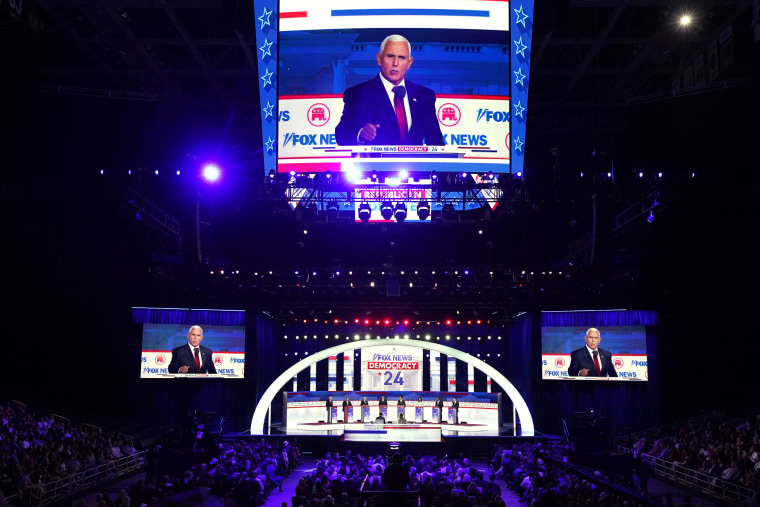Former Vice President Mike Pence suspended his 2024 presidential campaign Saturday, with his campaign running low on money and the Republican Party moving in a different direction than the longtime Indiana conservative.
He made the unexpected announcement at the annual Republican Jewish Coalition convention in Las Vegas.
"I came here to say it’s become clear to me this is not my time. So after much deliberation I have decided to suspend my campaign for president effective today," he said onstage. "I have no regrets. The only thing that would have been harder than coming up short would have been if we never tried at all."
His spokesperson Devin O’Malley said Pence chose the convention for the announcement because “the conflict in Israel is a microcosm of what Pence has been evangelizing regarding populism and traditional conservative values."
“RJC provided him one last opportunity to make that case and do so in front of a supportive audience," O'Malley added.
A Republican with the Pence campaign said they would be surprised if the former vice president endorsed one of the other candidates in the primary.
The announcement came as a surprise even to event organizers. Republican Jewish Coalition CEO Matt Brooks said he spent roughly 10-15 minutes with Pence before his speech and received no heads up that he would drop out.
"It was never mentioned," Brooks said. "I was surprised, and look, I mean, he picked an incredibly appropriate audience to do this. The heartfelt appreciation and gratitude for all that Mike Pence done in his years of public service was evident, and everybody has appreciated what he’s done and look forward to what he’s going to be doing next."
Republican candidates largely praised Pence following his decision.
"He’s been a good man of faith. He’s been a good man of service," former U.S. Ambassador to the United Nations Nikki Haley said. Florida Gov. Ron DeSantis tweeted: “Vice President Mike Pence is a principled man of faith who has worked tirelessly to advance the conservative cause."
But Trump took a different tack toward his former vice president.
"He should endorse me," Trump said during a speech in Las Vegas Saturday afternoon. "You know why? Because I had a great successful presidency, and he was the vice president. ... I chose him, made him vice president. But people people in politics are very disloyal. I've never seen anything like it."
When a person in the crowd shouted "traitor," Trump laughed and replied, "He could have done what he could have done."
Pence had struggled to gain support in a crowded primary field dominated by Trump. Having broken with his former running mate over certifying the 2020 election results on Jan. 6, 2021, Pence had begun to draw a starker line between himself and Trump on the campaign trail.
“When Donald Trump ran for president in 2016, he promised to govern as a conservative and together, we did,” he said at the New Hampshire Institute of Politics at St. Anselm College in September. “But it’s important for Republicans to know that he and his imitators in this Republican primary make no such promise today.”
Pence broke with Trump and those he called his “imitators in this Republican primary” on issues such as abortion, support for Ukraine and the national debt. He also called for federal abortion legislation to establish a 15-week minimum national standard, increasing military support to Ukraine and reforming Social Security to reduce the national debt.

But Pence's positions and experience did not attract GOP voters to his side, with rank-and-file members of the pro-Trump party turning on him after he certified the 2020 election results.
The lack of broad support meant fundraising struggles plagued Pence’s campaign, with its latest campaign finance filing showing $600,000 in debt and only $1.2 million cash on hand. After it scrambled to meet the donor thresholds for the first two Republican primary debates but made the stage, the campaign was unable to gain the 70,000 individual donors needed for the third.
Pence himself acknowledged the changing Republican Party often, telling NBC News last month that “the positions that I take as a traditional conservative are increasingly at odds” with those of the rest of the field and that he saw the party engaged in a debate over its future.
“It’s really a debate about whether or not the Republican Party is going to continue to hew to the commonsense conservative agenda that has defined our movement over the last 50 years or whether we’re going to, we’re going to heed the siren song of populism unmoored to conservative principles,” he said.
Pence focused his campaign on Iowa, where the campaign says he was over halfway through his promise to visit all 99 counties in the state.
He announced his candidacy in Ankeny, Iowa, on June 7 and had since visited the first caucus state 10 times for more than 40 events — mainly small-scale town halls and meet-and-greets.
Pence spent time reintroducing himself at every campaign stop despite his widespread name recognition, saying, “I’m well-known, but I’m not known well.”
Before he was Trump’s vice president, Pence spent a term as the governor of Indiana and represented his hometown district in Congress for 12 years.
